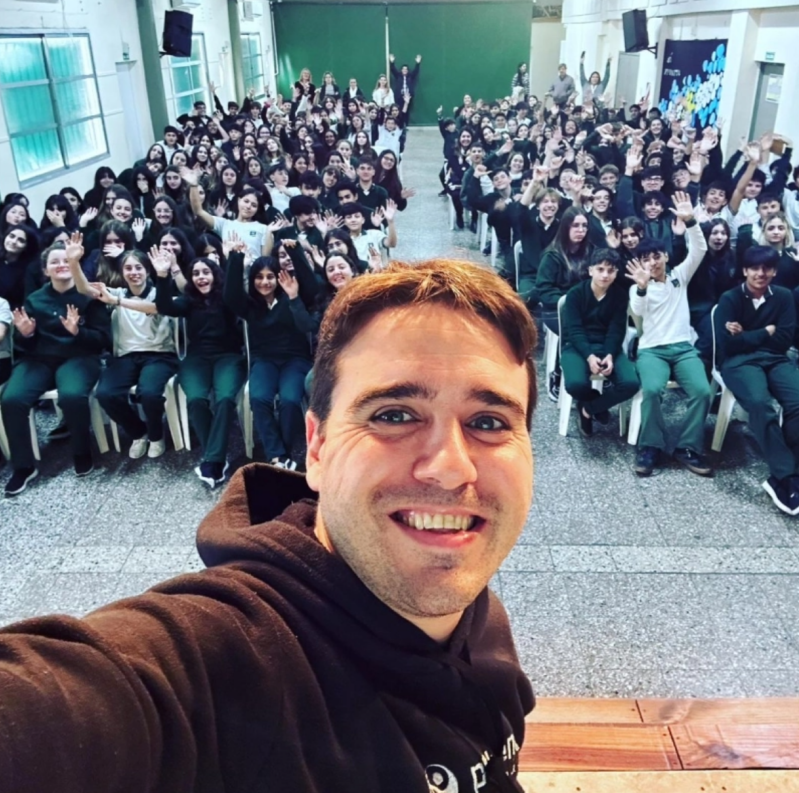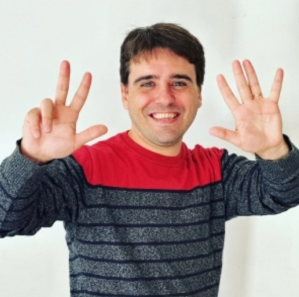
Suicide is as old as mankind. Throughout history, different cultures and different human societies have viewed suicide in different ways, depending on the philosophical, religious, intellectual, social and economic principles of each time period.
The scourge is the second leading cause of death among children and youth between 10 to 24 years old. Research shows that over 95% of people who committed suicide suffered depression or other mental conditions. Another cause is substance abuse, often combined with mental disorders.
Self-inflicted death is rarely the result of a single factor or issue. But health professionals who deal with suicide prevention warn that some causes can be identified that, combined with other factors, may lead someone to attempt suicide. Those are, among others, the absence of significant persons or institutions that could provide support, protect and accompany boys and girls in their psychological and social development.
The pressure to comply with the social standards of the time during the transition from youth to adulthood, mental disorders left untreated, and sexual abuse are other factors that might precipitate the choice to take one’s life.
The life story of Matías Kornetz, director and founder of “Prevenir es Amar” (Preventing is Loving) - an organization devoted to preventing suicide and supporting those who are immersed in substance abuse and may fall into suicidal behaviors - is the story of how a person who was frustrated, hurt and abused could be recovered and saved from self-inflicted death.
Going straight to the point, I ask him:
Can you get out of suicidal thinking?
“Good question,” he answers.
“It is a very complex condition. I have suffered of it; I am a survivor of suicidal behavior disorder and substance abuse disorder. Although each case has different characteristics, the answer is yes.”
Matías is the youngest of nine siblings from a blended family where financial problems, combined with emotional and overall mental health problems of some family members, substance and alcohol abuse, as well as many kinds of losses, created an explosive concoction that led him - only 11 or 12 years old at the time - to leave home and live on his own in the streets. Violence, abandonment, sickness, survival, lack of acceptance, frustration joined together to tarnish the purity of a child-teenager who suffered abuse, loneliness and isolation.
Suicide is the second leading cause of death in children and youth 10 -24 years old.
He sees the downcast look on my face after hearing such a dark story, and quickly adds, “But there are also some things that are fundamental to the process of recovery.”
“First, faith in Jesus is the greatest protection a person can have. Plus, the work of the Holy Spirit, convincing us of wrong, convincing us to come back, convincing us that the way, the truth and the life is Jesus Himself; and making us face the cross and get reconciled with God our Father. I think that the spiritual development is fundamental.
“Many discover it at the end of the recovery process. But it has always been there, from the beginning. God is the most interested party in saving our lives. And He made that clear when He sent His Son to die on the cross. So, I think that in my story, God was fundamental to recovery. Though I could only see it after some time, He had been there from the beginning.”

Matías was a teenager when he tried to commit suicide. Today, he is 36 years old and a good husband, father of three children, a professional who works for those who suffer and go through the same dark paths that he followed.
For him, it is a story of hope.
“In my case, I received professional care at a center specializing in substance abuse. Abuse, in my case, was a strategy for self-destruction. I was trying to die by substance abuse, that was my suicide attempt. I was on the verge of death several times by intoxication,” he shares, with inexplicable peace.
“So, health professionals are fundamental for recovery; specialized treatments are needed by professionals in each of the different areas. I think that, just as each therapeutical process and each recovery process is different, there is something that is the same for all cases, and it is the need to follow the treatment, regardless of the spiritual strength or the faith that the person may have, or the experiences they may have in their community of faith… We need to work on all aspects of behavior, habits, the ways to relate with others that were shaped by those disorders.”
How can we work in our faith communities?
“You can offer that service, provided you have the necessary professionals,” he said. “On the other hand, the subjective, emotional safety net, the available family, is fundamental, understanding that they will also be affected, right? The addiction disease – as a suicidal behavior disorder - not only affects the person who abuses substances, but all of the people around them”.
When the person commits 100% of their will power and has a community supporting them in the process, the chances of recovery are very high.
“I think that training faith communities is, without a doubt, one of the first steps that should be taken, since many people suffering from suicidal behavior disorder come to churches. Obviously, you also have acute treatment hospitals, health centers, schools, to mention some of the actors that are constantly assisting people suffering from this disorder. But faith communities are some of the institutions that people with suicide intention more often turn to. So then, as leaders, pastors, teachers, mentors, we need to acquire the knowledge base needed to identify risk situations, the signals, the indicators, and start talking about this. Because clearly it is a very sensitive subject.
“It is a very delicate subject. A subject that requires knowledge to open up, and also to bring closure, to understand how to intervene in each case that may come up. To determine when the situation can wait, and when it requires emergency action—and in that case, where to go, how to support the intervention, once the person is with the professionals that will move them away from the immediate risk to their life. As a pastor, as a leader, as a mentor, how can I support them? What can I do, what mustn’t I do? All of these skills, this knowledge, are fundamental in pastoral work, fundamental in leadership work.”
Can suicide be prevented?
“Absolutely, yes. Suicide is a preventable cause of death. To prevent this, we need to acquire the necessary knowledge in all areas. All social actors who are part of society, like health workers, nurses, doctors, psychologists, psychiatrists, must be trained on suicide prevention. Education staff, especially those who work with teenagers at the most vulnerable age, 12-17 years old, must acquire the necessary knowledge, that is, how to identify indicators, signals, risk factors, in order to provide support, accompany and, when necessary, to refer the person to psychological care.
“And, obviously, in the church environment, all religious leaders, pastors, teachers, need to acquire the necessary knowledge because, within the communities of faith, many people are going through a process of suicidal thinking. In many cases, people have been having death thoughts for a long time without any kind of assistance or support. We also need to know when to refer them to professional care, to discern when it is not a spiritual issue, but a psychological issue. So as a church, we need to acquire all this knowledge responsibly.”
Everything starts with Jesus, because He is the beginning and the end, the alpha and the omega. Faith in Jesus is the greatest protection factor a person may have.
Are communities of faith up to this task?
“Because of fear, the Church has been silent about this for a long time. And when we spoke about it, maybe, it was to condemn it, based on what we understood that God thinks of suicide, as we see it in His Word. That was the only message of the church on suicide.
“I think that today, because all the findings from studying suicide in the scientific world, we have much more information and knowledge available, and we can work out other strategies. We can produce other thoughts, other arguments and other interventions. I think that educating pastoral and leadership teams is the right way to go in order to provide support for people who suffer from suicidal behavior disorder…
“In communities where there is empathy, cooperation, solidarity, going together, recovery results are so much better. I am a living example of this. I am the result of a recovery process that included support from God, family, professionals, a willing community of faith, a club, a school that understood the situation and was able to support me as far as they could go. I see strength there, the strength of a community, even beyond the church. Everything starts with Jesus, because He is the beginning and the end, the alpha and the omega. Faith in Jesus is the greatest protection factor a person may have.”
Can a person get out of a suicidal behavior by themselves?
“I don’t think so. Although each case has its characteristics, there is no doubt that when we are all contributing, all willing, all ready, all available, recovery chances are much higher. And, it must be said, even when all of this is in place, if the person in question does not put 100% of their will power or does not make the effort to do their part, it is extremely difficult. Because sometimes, even when surrounded by support, if we do not choose to summon all of our strength and endure the suffering, that suffering we wanted to dull with substances or making drastic choices such as ending our life, obviously, we are not going to get results.
“But when the person puts 100% of their will power and has a community that supports them in the process, the chances of recovery are very high. That is why I firmly believe that suicide and addictions are preventable. I firmly believe that the Church has everything that is needed to face this problem and conquer it in Jesus’ name.”
Through his organization "Prevenir es Amar", Matías trains and helps pastors, leaders and mentors to prevent and treat addictions and suicidal behaviors. He is currently working on presenting the next conference called "Rompiendo el silencio" (Breaking the silence), version 2024, under the theme “The truth will make us free”, focusing on suicide, addictions and violence.
"Every day, families and people with psycho-social problems come to thousands of churches around the world. Now there are more and more people suffering from suicidal behavior disorder, self-harm, self-destructive behavior, problematic substance abuse, with compulsive conducts, who suffer different kinds of violence. As leaders, pastors and all those who work within the community, representing the church of Jesus Christ, we must be trained to face these problems that hit our communities so hard.”
More information on his project is available in Spanish at www.preveniresamar.org.
First published at Diario Cristiano, Christian Daily International's Spanish edition.





